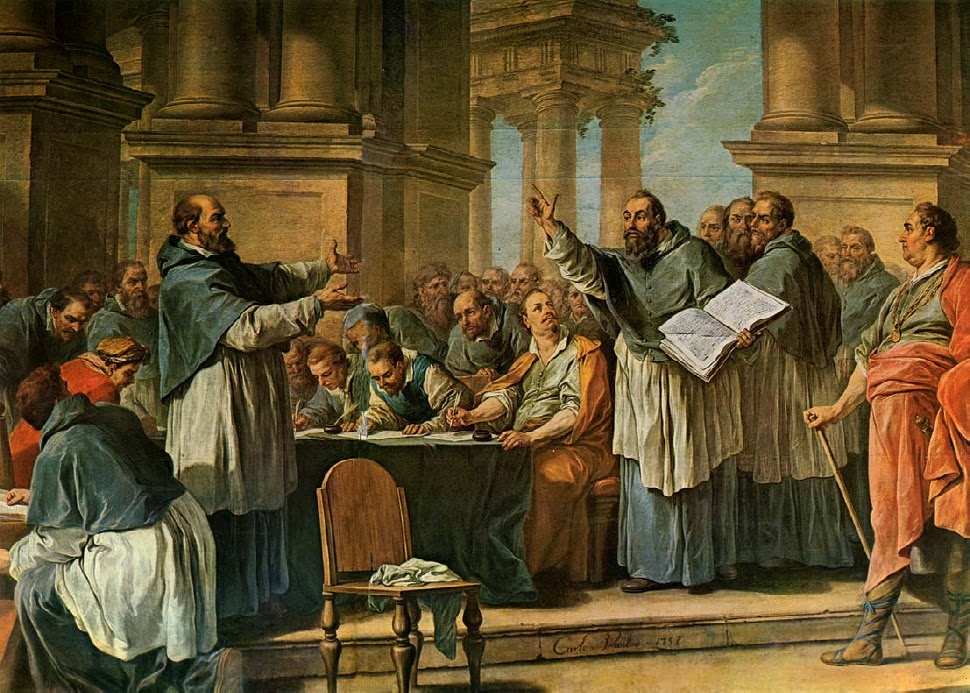Macarius (imperial Legate) on:
[Wikipedia]
[Google]
[Amazon]
Marcarius was an imperial
 The phrase ''Macarian Times'' became a
The phrase ''Macarian Times'' became a
notary
A notary is a person authorised to perform acts in legal affairs, in particular witnessing signatures on documents. The form that the notarial profession takes varies with local legal systems.
A notary, while a legal professional, is disti ...
sent in 340 to enforce an imperial edict against the Donatist
Donatism was a Christian sect leading to a schism in the Church, in the region of the Church of Carthage, from the fourth to the sixth centuries. Donatists argued that Christian clergy must be faultless for their ministry to be effective and the ...
community, in Bagai
Bagai was a Roman–Berber city in the province of Africa Proconsularis. It must have been of some reasonable size, as it was also the seat of an ancient Catholic bishopric. The ancient city has been identified with ruins at Ksar-Bagaï outsid ...
, Numidia, Roman North Africa
Africa Proconsularis was a Roman province on the northern African coast that was established in 146 BC following the defeat of Carthage in the Third Punic War. It roughly comprised the territory of present-day Tunisia, the northeast of Algeria, ...
.
Macarius' mission
His original mission had been to distribute donations from the emperorConstans
Flavius Julius Constans ( 323 – 350), sometimes called Constans I, was Roman emperor from 337 to 350. He held the imperial rank of '' caesar'' from 333, and was the youngest son of Constantine the Great.
After his father's death, he was mad ...
, in North Africa churches in an attempt to end the split between Donatists and Catholics. The local Donatists, however, resisted the legates and aided by Circumcellion groups from the surrounding district, a revolt took place. Rumor spread he had placed imperial images on the Eucharist
The Eucharist (; from Greek , , ), also known as Holy Communion and the Lord's Supper, is a Christian rite that is considered a sacrament in most churches, and as an ordinance in others. According to the New Testament, the rite was instit ...
table and the cry of the rebels was "What has the emperor to do with the church"
Optatus
Saint Optatus, sometimes anglicized as St. Optate, was Bishop of Milevis, in Numidia, in the fourth century, remembered for his writings against Donatism.
Biography and context
Optatus was a convert, as we gather from St. Augustine: "Do we not s ...
records that the Donatists struck first and the retaliation by the soldiers resulted in a slaughter, of the local church groups.
A meeting with the Donatists was called, but the legates had the bishops chained and flogged, and some days later the bishops were killed, Donatus of Bagai thrown down a well and Marculus off a cliff. There is some suggestion that this was carried out by the soldier without Macarius orders but either way, Marcarius set camp at a nearby imperial estate
An Imperial State or Imperial Estate ( la, Status Imperii; german: Reichsstand, plural: ') was a part of the Holy Roman Empire with representation and the right to vote in the Imperial Diet ('). Rulers of these Estates were able to exercise si ...
and suppressed the revolt over the following months. In this "''Macarius did not discriminate between moderate Donatist and extreme Circumcellionist.''"
Following the events at Bagai the rift between Catholic and Donatist became intractable. and never forgotten. The Donatists never trusted the Catholic factions again and the dispute became ever more violent over the coming decades.
Donatus of Bagai was held by the Donatists to be a Martyr
A martyr (, ''mártys'', "witness", or , ''marturia'', stem , ''martyr-'') is someone who suffers persecution and death for advocating, renouncing, or refusing to renounce or advocate, a religious belief or other cause as demanded by an externa ...
and a shrine to him and others killed at this time has been recently excavated in Bagai
Bagai was a Roman–Berber city in the province of Africa Proconsularis. It must have been of some reasonable size, as it was also the seat of an ancient Catholic bishopric. The ancient city has been identified with ruins at Ksar-Bagaï outsid ...
.
Legacy
 The phrase ''Macarian Times'' became a
The phrase ''Macarian Times'' became a sound bite
A sound bite or soundbite is a short clip of speech or music extracted from a longer piece of audio, often used to promote or exemplify the full length piece. In the context of journalism, a sound bite is characterized by a short phrase or sentence ...
to express the idea of Catholic-imperial persecution by Donatists preachers."Far from securing unity, the Marcarian mission had left a bitterly divided memory half a century later.
Augustine
Augustine of Hippo ( , ; la, Aurelius Augustinus Hipponensis; 13 November 354 – 28 August 430), also known as Saint Augustine, was a theologian and philosopher of Berber origin and the bishop of Hippo Regius in Numidia, Roman North A ...
latter accepted the Macarius had acted excessively, while Optatus
Saint Optatus, sometimes anglicized as St. Optate, was Bishop of Milevis, in Numidia, in the fourth century, remembered for his writings against Donatism.
Biography and context
Optatus was a convert, as we gather from St. Augustine: "Do we not s ...
chilled those who fled from the approach of Macarius.Michael Gaddis, There Is No Crime for Those Who Have Christ: Religious Violence in the fourth century North Africa. (University of California Press, 14 Oct. 2005) p136
References
{{DEFAULTSORT:Macarius 4th-century births 4th-century Romans Ancient Christians involved in controversies Numidia (Roman provinces) Schisms in Christianity Year of birth unknown Year of death missing